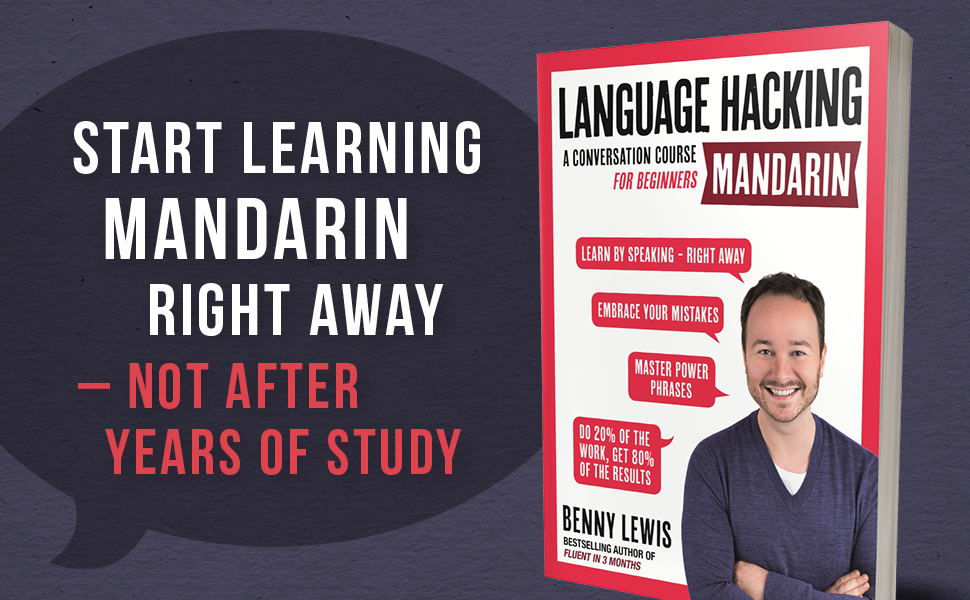The Irish Polyglot Benny Lewis has published a new book: Language Hacking Mandarin – a conversation course for beginners. It prepares you to have your first basic conversations in Chinese – right away!
- 220 pages
- 10 units or missions
- With downloadable audio and answer key in the book
- Instruction language is English, dialogues or written in pinyin
When I picked the book out of our mailbox, I wasn’t sure what to expect. How should “Language Hacking Mandarin” fit together with “conversation course for beginners”?
Benny Lewis aka The Irish Polyglot
Had I known more about the author I might have guessed. Benny Lewis, aka The Irish Polyglot, is not just anybody. He speaks Mandarin Chinese, Arabic, French, German, Spanish, Italian, Portuguese, Hungarian and American Sign Language(!). Some of you probably heard of his book “Fluent in 3 months” in which he uncovers his language learning philosophy. According to his own account he’s not even especially gifted for languages, he was simply so frustrated after six months of learning Spanish that he had to find an approach that worked.
So what about his approach? The key point of his learning strategy reminds me of Chris Lonsdale’s mantra “Use your New Language as a Tool to Communicate, right from Day 1.” Just like the latter Lewis believes in communicating from the very start. No years of preparation and meditation, no grammar classes and vocabulary drills. Conquer your fears and start speaking Mandarin with natives as soon as you can say 你好.
#LanguageHacking
Although this idea isn’t new, it’s far from universally accepted in the Mandarin learning community – let alone adapted. After all, it’s easier said than done. Fortunately, Lewis does provide us with workable tips and tricks in the 220 pages of his course. It consists of 10 units or missions that build up to different speaking goals, while introducing the reader to the essence of #LanguageHacking at the same time:
#LanguageHacking is a completely different approach to learning a new language. It’s not magic. It’s not something only ‘other people’ can do. It’s simply about being smart with how you learn: learning what’s indispensable, skipping what’s not and using what you’ve learned to have real conversations in Mandarin right away. As a language hacker, I find shortcuts to learning new languages – tricks and techniques to crack the language code and make learning simple so I can get fluent faster. #LanguageHacking is not just a course, It’s a new way of thinking about language learning.
What I like about the book is that it cuts to the chase and is extremely practical: You want to be able to have your first conversation in Chinese? This is what you have to do. Like that. It’s like an adventure. What’s more, the author knows what he’s writing about, because he’s been there himself. He knows the difficulties, the pain and the shame when you asked a question, but can’t understand the answer. He also provides tips to deal with such situations – like having your first conversations online and using translation tools and cheat sheets.
Does #LanguageHacking work for everybody?
This book is really written for self-motivated, autonomous learners, so it’s not meant to be used in class or to prepare for the HSK exam or any other official test. The main goal is to get you to speak and show you ways to go about this process independently and efficiently.
This approach does include leaving your comfort zone sooner rather than later, so if you’re not OK with that, #LanguageHacking probably isn’t what you’re looking for. Speaking from Day One requires a playful state of mind and a huge load of what is usually called tolerance of ambiguity, since you’ll be doing plenty of guesswork during your conversations. It also helps a lot if you don’t take yourself too seriously and accept that you can’t express yourself with the level of eloquence you’re used to.
Challenge yourself
If you want to learn to speak above all else and are prepared to challenge yourself, you might as well give Language Hacking Mandarin a try and go on your own language learning adventure.
Likes
- Original approach, not the regular textbook
- Not just a course, Lewis rethinks the language learning process, shares his learning hacks
- The book takes you by the hand and also challenges you to go out there and do things
Dislikes
- This is not a criticism of the book itself, more an observation from experience: conversation has two parts – speaking and listening. The latter shouldn’t be underestimated, meaning the average learner will need a lot more listening material and input than this book (or any other book) can provide.







